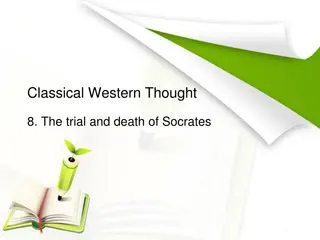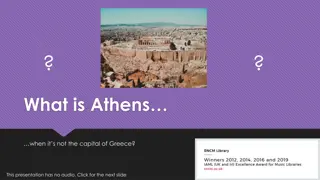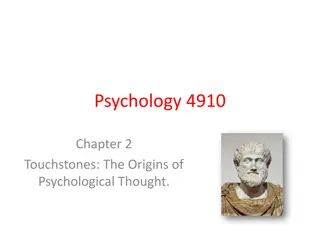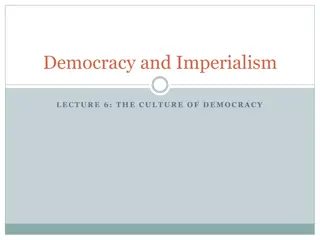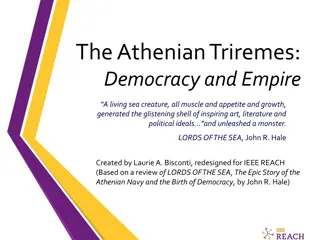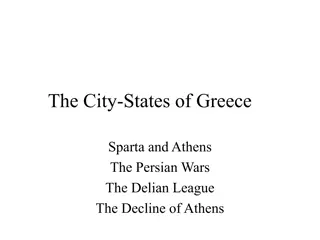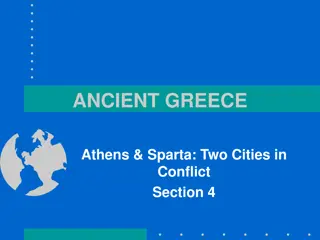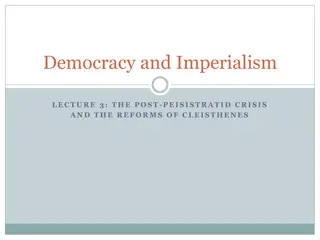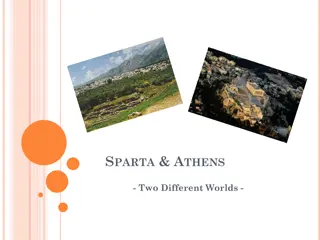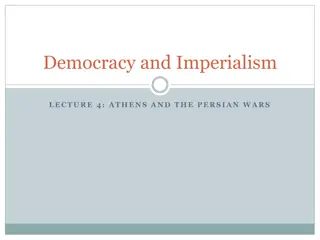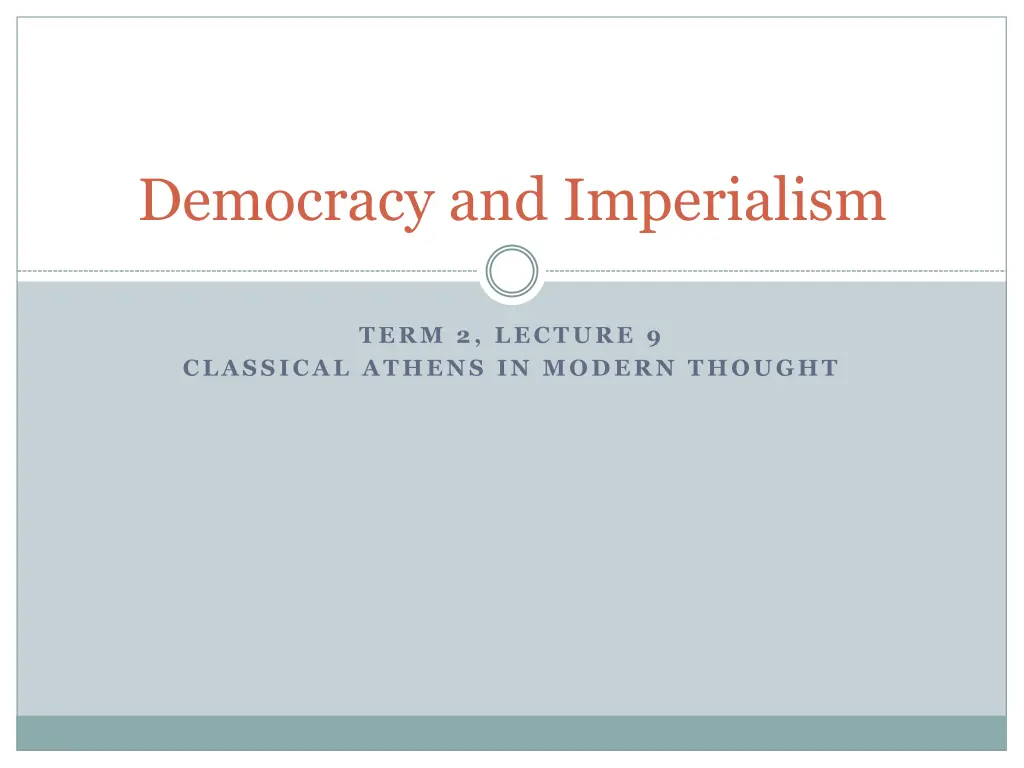
Classical Athens in Modern Thought: Democracy and Imperialism Analysis
Explore the influence of Classical Athens on modern political ideologies, delving into the juxtaposition of democracy and imperialism. The evolution of democracy through different historical periods and its impact on European political thought are examined, alongside key questions regarding the perception of democracy as a societal good. Discover how ancient concepts of demokratia have shaped governance systems over time, from Athens to the Roman Empire and beyond, shedding light on the complexities of democratic practices in various civilizations.
Download Presentation

Please find below an Image/Link to download the presentation.
The content on the website is provided AS IS for your information and personal use only. It may not be sold, licensed, or shared on other websites without obtaining consent from the author. If you encounter any issues during the download, it is possible that the publisher has removed the file from their server.
You are allowed to download the files provided on this website for personal or commercial use, subject to the condition that they are used lawfully. All files are the property of their respective owners.
The content on the website is provided AS IS for your information and personal use only. It may not be sold, licensed, or shared on other websites without obtaining consent from the author.
E N D
Presentation Transcript
Democracy and Imperialism TERM 2, LECTURE 9 CLASSICAL ATHENS IN MODERN THOUGHT
A Tale of Two Cities Roman institutions developed independently as a republic, not a democracy Roman expansion coincides with disappearance of democracies in the Greek world Roman view of (Athenian) democracy, heavily influenced by Plato & Aristotle, consistently negative
Key questions In what way has democracy survived in European political thought? How did we come to think of democracy as an absolute good? To what extent do modern Western states show the legacy of Athenian democracy?
What is demokratia? Equality of all citizens Offices filled by sortition Magistrates accountable to the demos Supremacy of the Assembly Culture of personal liberty (Pericles)
A flexible term Democracy as synonym for system of government: Roman Empire as democracy 6th-century Constantinople: democracy = political riot
Reawakening or reinvention? Rashidun caliphate (632-661): election of caliphs but shura is only recommendation, councils very small, Umayyads make caliphate hereditary Republic of Florence (from 1115): Council filled by sortition from all citizens but very unstable, soon devolves into oligarchy Swiss Landsgemeinde (13th century): Council, Assembly, vote by show of hands but no connection to Athens
No Renaissance for democracy Republic of Venice, contemporary hallmark of stable constitution, mixed but mainly oligarchic Despite recovery of Greek, Renaissance mostly looked to Latin and Rome Main Greek texts read were Plato, Aristotle, Plutarch
The Greek tradition in a nutshell One time, when he was delivering an opinion to the people, and he met with their approval, and saw that all alike accepted his argument, he turned to his friends and said: could it be that I am saying something stupid without realising? Plutarch, Phocion 8.3
Democracy in Early Modern thought Democracy only studied as a type of government (one of Aristotle s 6 or 7), not as historical reality Athenian democracy characterised as ochlocracy fickle, unruly, ungrateful, uncontrollable Praise only for Solon s Athens Examples of good constitutions: Sparta, Rome
Athens and Sparta in Enlightenment thought It was in the very bosom of Greece that there was seen to arise that city as famous for her happy ignorance as for the wisdom of her laws, that republic of demigods rather than men, so superior to humanity did their virtues seem! O Sparta! Eternal shame to a vain doctrine! Jean-Jacques Rousseau What benefit did Sparta do to Greece? Had she ever a Demosthenes, a Sophocles, an Apelles, or a Phidias? The luxury of Athens formed great men of every description. Voltaire
Classics in the Age of Revolution Greek history largely derived from Plutarch: anecdotal, hostile to democracy, focus on great men Greeks admired only as educators; Athens serves as warning against mob rule Reformers admire Rome, republics and mixed constitutions
The Founding Fathers Levity, gayety, inconstancy, dissipation, intemperance, debauchery, and a dissolution of manners, were the prevailing character of the whole nation [of democratic Athens]. - The astonishment ought to be that there is one sensible man left in the world who can still entertain an esteem, or any other sentiment than abhorrence, for a government in a single assembly. John Adams
New age, new politics Locke, Paine: resistance to monarchy, importance of individual rights (especially property rights) Montesquieu: separation of powers Hamilton, J.S. Mill: representation as a moderating principle
The Great Switch (1) Late 18thcentury: Founding Fathers terrified of democracy. US not called democracy Early 19thcentury: democracy begins to be used to describe the US Late 19thcentury: democracy regarded as ideal government throughout Western world
The Great Switch (2) Late 18thcentury: democracy defined as mob rule Early 19thcentury: de Tocqueville defines Democracy in America as the largest possible amount of liberty accorded to each citizen Late 19thcentury: democracy defined as representative government guaranteeing individual liberty, property rights, freedom of speech
The Great Switch: why? American experiment, surprisingly, turns out to work Modern representative system allows redefinition of terms Liberal philosopher-politicians embrace widening franchise for representative government (including, in UK, pay for MPs & secret ballot)
Classics and the Great Switch Rise of academic scholarship redefines Athenian democracy: Grote reads Herodotus, Thucydides, Demosthenes Greek War of Independence focuses West on Greece Increasing Western claim to Greece as European heritage
What is democracy? Equality of all citizens Representative bodies filled by fair elections Politicians accountable to voters Culture of equality, liberty, civil rights Democracy as unquestionably positive
The death of demokratia Not a single Athenian institution seems to have left its mark on posterity. Mogens Hansen
A future for democracy Detachment from politics & apathy of voters spurs innovation Scholarship pushes Athenian model as foil for reform Experiments with direct democracy Experiments with sortition, deliberative democracy
The survival of democracy Tradition of democracy uniformly negative until 19th century Switch in perception driven by change in meaning: our democracy is not demokratia Legacy of democracy is only now starting to make itself known





